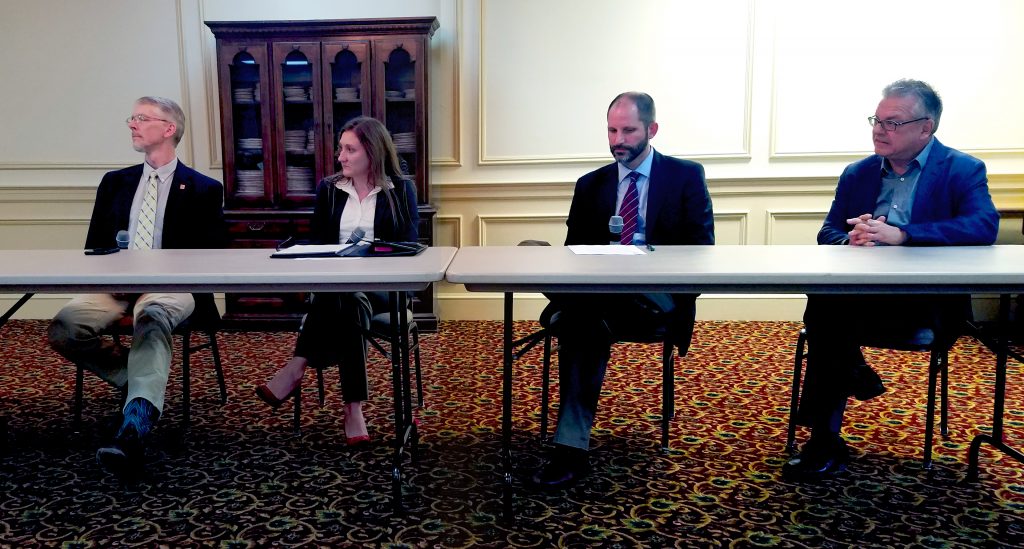
According to Christian tradition, on October 31, 1517, Martin Luther nailed his 95 theses on the Wittenberg Castle Church, and sparked the Protestant Reformation. Five hundred years later, on October 31, 2017, Judson College hosted a panel to analyze the deeper meaning behind this act in celebration of Reformation Day.
The panel was moderated by Dr. Scott Bullard, academic dean at Judson. The four panelists included Dr. Coleman Fannin from Berry College, who spoke in chapel earlier that day. Also present was Judson’s own religion professor, Stephanie Peek, and Siloam Baptist’s pastor, the Reverend John Nicholson. Finally, Dr. Thomas Herwig was visiting from University of Alabama and First Presbyterian Church in Tuscaloosa.
These scholars discussed the complicated history of Luther and how he helped bring the church to where it is today. Early in the panel, Peek brought up how Luther’s theology was built on a new understanding of what the righteousness of God was—a gift reckoned unto the sinner, not a status earned. Nicholson followed up with an anecdote showing Luther’s early emphasis on holiness. When he was a monk, he would arrive at confession with a long list of minuscule sins, to the confusion of the confessor, who expected fewer and more grievous offenses. Upon study of Romans however, Luther began to focus on the righteousness of God imputed to the sinner, upon which the Protestant church bases its understanding of salvation.
Luther’s main conflict with the Church prompting his 95 theses was the sale of indulgences. As Herwig explained the, indulgences were documents that stated how many years the individual’s money had subtracted from time in purgatory on behalf of themselves or a dead relative. From Peek’s perspective, Luther was only partially concerned about the theological implications of this, and was more concerned about the corruption within the church that was leading to the profit of the clergy and poverty of their parishioners.

According to Christian tradition, on October 31, 1517, Martin Luther nailed his 95 theses on the Wittenberg Castle Church, and sparked the Protestant Reformation. Five hundred years later, on October 31, 2017, Judson College hosted a panel to analyze the deeper meaning behind this act in celebration of Reformation Day.
The panel was moderated by Dr. Scott Bullard, academic dean at Judson. The four panelists included Dr. Coleman Fannin from Berry College, who spoke in chapel earlier that day. Also present was Judson’s own religion professor, Stephanie Peek, and Siloam Baptist’s pastor, the Reverend John Nicholson. Finally, Dr. Thomas Herwig was visiting from University of Alabama and First Presbyterian Church in Tuscaloosa.
These scholars discussed the complicated history of Luther and how he helped bring the church to where it is today. Early in the panel, Peek brought up how Luther’s theology was built on a new understanding of what the righteousness of God was—a gift reckoned unto the sinner, not a status earned. Nicholson followed up with an anecdote showing Luther’s early emphasis on holiness. When he was a monk, he would arrive at confession with a long list of minuscule sins, to the confusion of the confessor, who expected fewer and more grievous offenses. Upon study of Romans however, Luther began to focus on the righteousness of God imputed to the sinner, upon which the Protestant church bases its understanding of salvation.
Luther’s main conflict with the Church prompting his 95 theses was the sale of indulgences. As Herwig explained the, indulgences were documents that stated how many years the individual’s money had subtracted from time in purgatory on behalf of themselves or a dead relative. From Peek’s perspective, Luther was only partially concerned about the theological implications of this, and was more concerned about the corruption within the church that was leading to the profit of the clergy and poverty of their parishioners.
Luther based his controversial decisions on sola scriptura—scripture alone. Nicholson brought up the interesting point that Luther somewhat opposed the inclusion of seven books of the Bible, including James, though he did not ultimately remove any. He still viewed the opinion of church officials as having value, but only as far as they lined up with scripture, not holding their own authority.
This shift away from the authority of man completely reshaped—reformed, if you will—how Protestants view the gospel. Assurance that one would make it into heaven was no longer based on the purchase of indulgences or the testimony of priests. As Herwig discussed, Protestants had to find a new source of assurance when the structure of the Catholic church was removed. He went on to point out a western theology of sorts became prominent at this time in which material blessings were viewed as heavenly favor reflective of one’s salvific status. However, as Nicholson pointed out, the Reformation also gave rise to a more biblical 1 John theology that recognized Jesus’ sacrifice as the assurance of our salvation.
This focus on the grace of God is what allows salvation to remain available to the Jew and Gentile, rich and poor, man and woman. Five hundred years later, that is where the focus remains—on what truly good news the gospel is.